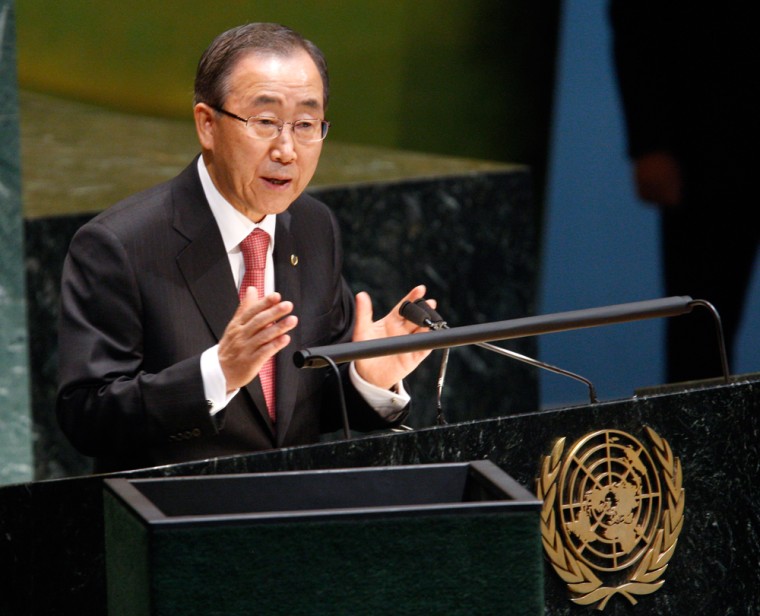Under the cloud of a global financial crisis, Secretary-General Ban Ki-moon on Monday urged the world's rich nations to spend $72 billion a year to help Africa achieve U.N. goals to fight poverty, improve health and ensure universal primary education.
He told the opening of a high-level meeting on Africa's development needs that the price tag may be daunting but "it is affordable," and pointed to the estimated $267 billion that the world's richest nations spent last year just on agricultural subsidies.
"In this context, the cost of solving the food crisis, addressing global warming and pulling millions out of extreme poverty in Africa looks like good value," he said.
Ban said last week he was deeply concerned that the current economic slowdown and turmoil on Wall Street could have a "very serious negative impact" on the ability of rich nations to help achieve the U.N. Millennium Development Goals by 2015. But he made no mention of the economic crisis on Monday.
However, General Assembly President Miguel d'Escoto Brockmann, a Roman Catholic priest allied with Nicaragua's leftist president, blamed rich developed nations for the breakdown of global trade negotiations that would open markets to poorer countries. He then alluded to the current financial crisis.
"Those same proponents of extreme liberalism change their tune at the first sign that their economic might could be at risk and that their citizens could suffer the pain they inflict on others," d'Escoto said.
He urged world leaders to eliminate what he called "the market distortions generated by developed-country subsidies," which he said "have played a key role in worsening the global food crisis we are witnessing today."
"This crisis has had a terrible impact on African populations and has extinguished what little hope there was of halving, by 2015, the proportion of people in Africa who suffer from hunger," d'Escoto said.
Money scarce
World leaders arrived in New York as the U.S. Congress starts debate on a $700 billion proposal to buy a mountain of bad mortgage debt in an effort to revive U.S. credit markets.
Whether world leaders are prepared to make fresh commitments to help the poor remains to be seen.
French President Nicolas Sarkozy, speaking on behalf of the European Union, made no commitment but assured the meeting: "Europe as a whole is at the side of Africa."
The week-long meetings at the United Nations begin Monday with a high-level session on African development. Some 106 of the 192 U.N. member states have signed up to attend, including 34 heads of state and 11 heads of government.
Undersecretary-General Cheick Sidi Diarra, Ban's special adviser on Africa, said he was concerned about the world economy's downturn — but he still expected developed countries to keep their promises of increased aid.
At a summit in Scotland in 2005, the major industrialized powers agreed to increase yearly aid to developing countries by $50 billion by 2010 compared to 2004, and to channel $25 billion of the increase to Africa. But Ban said in a recent report that rich donor nations have failed to deliver on their promises and must increase aid by $18 billion a year — and of that, $7.3 billion would have to go to Africa.
Diarra, Ban's special adviser on Africa, said that while most of Africa's economies are now growing more rapidly than they did a decade ago, the continent remains "off track" to achieve the U.N. goals. They include cutting extreme poverty by half, ensuring universal primary education and halting the HIV/AIDS pandemic — all by 2015.
Living in poverty
A new report from the secretary-general said a number of countries have made notable progress on some goals — but not a single African country is likely to achieve all the goals by the target date.
According to the report, two-fifths of Africa's population still live on less than $1 a day, the continent has 12 percent of the world's population but accounts for just 1 percent of global gross domestic product, and its volume of external trade represents just 2 percent of global trade.
There is also serious concern that international assistance to help the badly struggling Palestinian economy is in jeopardy. The main donors met Monday morning on the sidelines of the Africa session, and ahead of that meeting U.S. Secretary of State Condoleezza Rice held a session with Ban on Sunday afternoon and then with Palestinian Prime Minister Salam Fayyad.
Led by Europe, international donors in December pledged $7.4 billion over three years to help Palestinians as new peace talks began with Israel.
"We'll have an opportunity to make certain that everybody is paying attention to their Paris commitments to the Palestinians and also to get a report from Prime Minister Fayyad on how things are going on the ground," Rice said on her way into the meeting.
Asked whether the Arabs were coming through with their pledges, Rice said: "Yes, I believe people are very attentive to their pledges but this will give us another opportunity."
The General Assembly's annual ministerial meeting opens Tuesday with speeches by Ban; President Bush, making his last appearance before the world body; and French President Nicolas Sarkozy, also representing the European Union.
Iranian President Mahmoud Ahmadinejad — whose nuclear program will be discussed on the sidelines of the session — was scheduled to speak on Tuesday afternoon along with Sudan's Vice President Ali Osman Taha.
